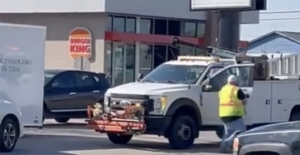
Chicago has been under the national spotlight after ranking number one in the number of homicides recorded in 2012, according to a report released by the FBI.
There were 509 murder victims in the Windy City last year.
Chicago drill music has been accused of being the driving force behind the murder rate.
Rising Chicago artists Lil Durk and Lil Herb acknowledge the killings occurring in their hometown, but say the homicide rate is a problem all over the nation.
The two discussed their thoughts on the staggering homicide rate in their hometown during an interview with VladTV.
“I be hearing about a lot of stuff, but in other cities,” Durk said. “I be hearing a lot about Philly. They killing in Philly.”
Lil Herb echoed similar sentiment.
“To be honest, I don’t know. That’s happening everywhere,” he said. “…Cause Chicago a big city, one of the main cities…New York, L.A., Chicago, Atlanta. Them the big cities, so you gon hear about all the stuff that’s going on. It’s a lot of killing going on out here.
“If you from Chicago, you go to New York, L.A., you gotta still be careful the same. I don’t get cautious being more careful in Chicago,” he adds.
Despite demoralizing statistics, Chicago isn’t the only city that should be receiving attention.
A number of deadly crimes plague the urban community in metropolitan cities across the country. The remaining top 15 cities with the most murders were as follows:
Cities with the most homicides in 2012
1. Chicago | 509
2. New York | 419
3. Detroit | 386
4. Philadelphia | 331
5. Los Angeles | 299
6. Baltimore | 219
7. Houston | 217
8. New Orleans | 193
9. Dallas | 154
10. Memphis | 133
11. Oakland | 126
12. Phoenix | 124
13. St. Louis | 113
14. Kansas City | 105
15. Indianapolis | 101
Source: FBI
A tragedy is occurring in countless cities across the U.S. with a sizable urban African-American demographic. Black men are dying at the hands of other black men at a high rate in America.
African Americans represent only 12.6% of the country’s population, but account for nearly half of the citizens murdered in the U.S. each year.
A 2007 study conducted by the Bureau of Justice Statistics found that nine out of 10 black murder victims were killed by other blacks from 2001 to 2005.
What is even more chilling is the amount of African Americans killed in this nation in 2009 nearly mirrors the troops killed in the Iraq and Afghanistan wars combined.
More than 6,572 U.S. service members have died in Operation Iraqi Freedom and Operations Enduring Freedom, according to statistics compiled by the Washington Post.
6,556 African Americans were murdered in 2009 alone, according to statistics compiled by the Department of Justice and FBI.
“Black victimization is a real problem, and it’s often black on black,” said David A. Harris, a law professor at the University of Toledo who studies crime trends, according to the Washington Post. “That aspect has to be brought into any attempt to address the crime problem, and the community itself must be called into the process.”
Michael Pfleger, pastor at St. Sabina church in South Side Chicago, attributes the dire circumstances Chicago is facing to a “perfect storm” of joblessness, poor education and guns.
Pfleger said violence occurs in neighborhood where there are “high unemployment rates.”
“You have poor education, poor schools, infrastructure that has been withdrawn; you have mental health centers that have been closed up. And where’s there a lack of businesses, you create a perfect storm for violence,” he said in the “Murder to Excellence: Life & Hip Hop in Chicago” documentary.
Plefeger explained there is easy access to guns in downtrodden Chicago neighborhoods.
“Then you have the whole gun issue. We have more guns than computers in our neighborhood,” he said. “And you have easy access to guns that the NRA and gun manufacturers realize that more access to guns the more money they make. So they can care less about what the result of it is. They can care less about the carnage in the streets. But they’re making money.”
Plefeger said urban Chicago resident are living in a “desperate situation.”
People in a desperate situation, he said, are going to make desperate choices.
“The perception is it’s the fault of individuals rather than what brought them,” he said. “I’m not taking anything away personal responsibility for the decisions a person makes, but unless you are also taking away personal responsibility for the decisions a person makes, but unless you are taking a look at the things that are creating that perfect storm, it’s only part of the picture.”
Pfleger said many of the brothers on the streets want better for themselves, but aren’t valued in the eyes of others.
“Part of the other reason is we have written off some of these brothers on the streets. Every Friday night we’re are talking to some of the brothers here and these are brothers who want better, who want better opportunities, who want jobs, who want education,” he said. “They feel like they’ve been told ‘you’re disposable.’ If you’re consistently told you are not valued, you begin not to value yourself or anybody else.
“We gotta see every life as valuable. Every single life. I hate when I hear the media talk about ‘Well, the police say he was gang-affiliate.’ As if that’s some kind of okay that he was shot and killed,” he said. “Nobody deserves to be shot, nobody deserves to be killed. We can’t get used to yellow police tape and yellow teddy bears and sirens at night like that’s the norm. That’s not the norm. That’s not a normal community.”
Sign up to become a member of kollegekidd.com by clicking here.
For Updates, Be sure to Follow kollegekidd.com on Twitter @_KollegeKidd by clicking here.
You can also stay up-to-date by liking kollegekidd.com FaceBook Page by clicking here





